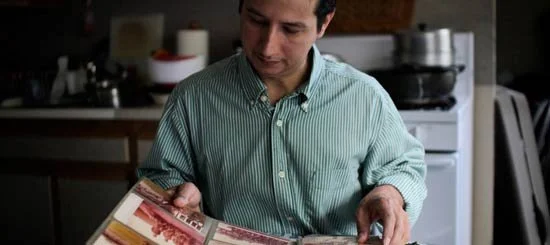Finding Oscar
A week and a half ago, This American Life aired the story of Oscar Ramirez, a Guatemalan man living in Boston. It’s a story that Oscar himself didn’t fully know until very recently. Here’s the teaser blurb:
In 1982, the Guatemalan military massacred the villagers of Dos Erres, killing more than 200 people. Thirty years later, a Guatemalan living in the US got a phone call from a woman who told him that two boys had been abducted during the massacre — and he was one of them.
It’s a tragic story but it’s also, in a bittersweet way, a hopeful one. Most of all, it’s masterfully told. I hope you’ll listen to it. The story is also available as an essay from ProPublica and as an eBook. Accompanying the essay is a slideshow, character guide, and timeline. It’s all very well-done.
The massacre at Dos Erres in December 1982 took place during the short-lived and brutal presidency of former army general Rios Montt. Earlier this year he was formally charged with genocide and crimes against humanity for the atrocities that occurred under his watch, and in late May a judge ruled he’d stand a genocide trial for the Dos Erres massacre as well.
I’ve blogged about Rios Montt before, mentioning that I was born in Guatemala during his presidency. The very fact that Montt is finally facing trial is extraordinary, given the widespread impunity that has been the norm in Guatemala since the war. And even more remarkable is the fact that he is being charged during the early days of the presidency of Otto Pérez Molina, another former military leader who, according to the U.S. State Department, “was stationed during the civil war in a region that saw some of the conflict’s worst atrocities against civilians.” One might imagine that this president specifically would prefer the secrets of the past to remain hidden.
What happened in the Dos Erres massacre is horrible, almost beyond words. But the story needs to be told. You can’t understand the proliferation of violent crime in Guatemala and elsewhere in Central America — or the tens of thousands of undocumented immigrants who have left these countries for the United States — without understanding this history and its legacy today.
If you don’t know very much about what took place in Guatemala (too few do), I’d encourage you to learn Oscar’s story. As you’ll see, it’s a story of tragic loss, but it also gets at the complexity of it all, when Oscar considers the mixed legacy of his adoptive father. It reminds me of the words of Aleksandr Solzhenitsyn in The Gulag Archipelago:
If only there were evil people somewhere insidiously committing evil deeds, and it were necessary only to separate them from the rest of us and destroy them. But the line dividing good and evil cuts through the heart of every human being. And who is willing to destroy a piece of his own heart?
I am grateful that Rios Montt is facing trial for his crimes, even as I mourn with the families of his victims. And I’m grateful that Oscar has been reunited with his biological father, even as I mourn the many losses that have marked his life. Most of all, while stories like these serve to remind us that this is not the way the world was supposed to be, I live with the expectant hope that one day, all things will be made new.
